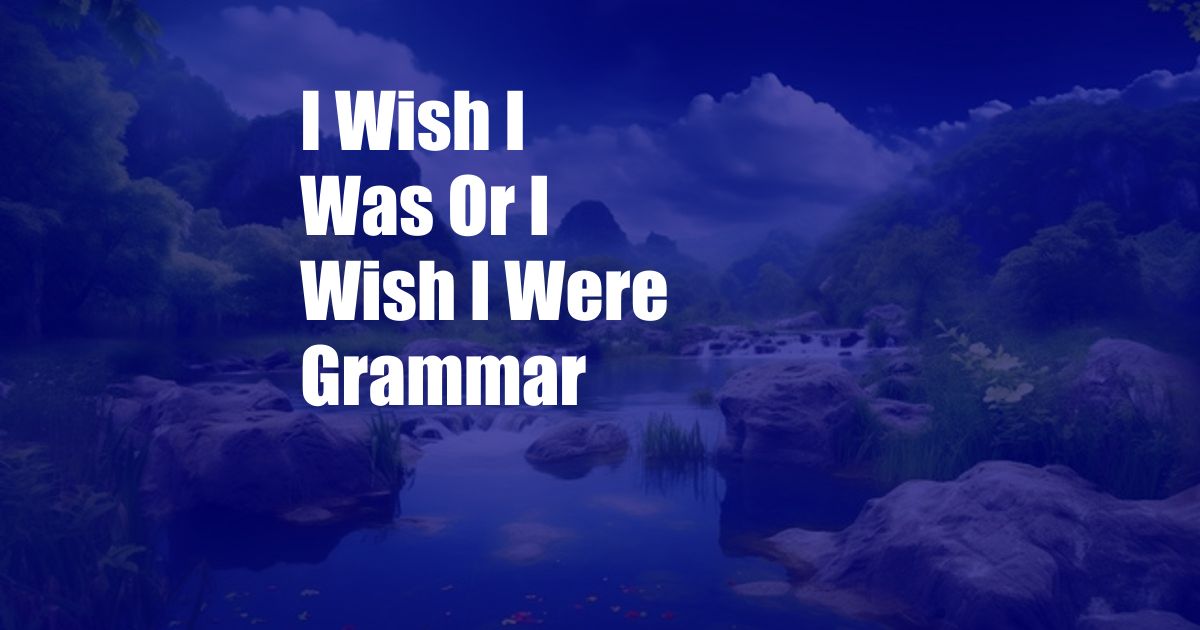
The Grammar Conundrum: “I Wish I Was” or “I Wish I Were”?
Language, a powerful tool of communication, often presents us with grammatical dilemmas that can leave us perplexed. One such conundrum is the choice between “I wish I was” and “I wish I were.” Join us as we delve into the depths of this grammatical labyrinth, exploring its history, meanings, and implications.
Throughout our lives, we often find ourselves expressing desires or regrets using the conditional phrase “I wish.” In such instances, the choice between “was” and “were” hinges on the nature of our wish.
The Realm of the Subjunctive Mood: “I Wish I Were”
The subjunctive mood, a grammatical construct used to express hypothetical or desired situations, plays a crucial role in this context. When our wish pertains to an imaginary or unrealized scenario, we employ the subjunctive form “were.” This grammatical convention aligns with the notion that our wish remains unfulfilled or contrary to reality, existing solely in the realm of imagination.
For instance, if you aspire to possess the artistic talents of a renowned painter, you might lament, “I wish I were as skilled as Vincent van Gogh.” In this example, “were” is the appropriate choice as your aspiration remains unrealized, existing only in the realm of wishful thinking.
The Embrace of Reality: “I Wish I Was”
In contrast, when our wish pertains to a real or attainable situation, we opt for the indicative form “was.” This choice acknowledges the possibility of our wish coming to fruition, aligning with the notion that our desire is grounded in reality rather than mere fantasy.
To illustrate, if you long for a simpler life, you might express, “I wish I was living in a cozy cottage by the sea.” Here, the use of “was” signifies your belief that such a lifestyle is achievable, even if it is not yet a reality.
The Ever-Evolving Landscape of Grammar
As language evolves, so too do its rules and conventions. While “I wish I were” has traditionally been considered the more grammatically correct form, contemporary usage reveals a growing acceptance of “I wish I was” even in contexts where “were” was once the standard choice.
This shift towards “was” can be attributed to several factors, including the influence of colloquial speech, the desire for simplicity, and the notion that language is a living entity that adapts to the needs of its speakers.
Expert Insights: Navigating the Grammatical Maze
To further illuminate this grammatical quandary, let’s consult the wisdom of language experts and scholars:
- Dr. David Crystal, renowned linguist: “In standard English, ‘were’ is generally used after ‘wish’ when the verb refers to something contrary to fact, whereas ‘was’ is used when the verb refers to something factual or possible.”
- The Chicago Manual of Style, respected style guide: “In formal writing, use ‘were’ in the subjunctive mood after ‘wish’ to express a hypothetical or contrary-to-fact condition.”
Tips for Making the Right Choice:
To guide your choice between “was” and “were” with confidence, follow these simple tips:
- Consider the nature of your wish: Is it an imaginary or real scenario?
- If your wish is unrealized or hypothetical, opt for “were.”
- If your wish is attainable and grounded in reality, choose “was.”
FAQs: Unraveling the Grammar Knot
Let’s address some common questions related to this grammatical puzzle:
- Q: When should I use “were”?
A: Use “were” when your wish expresses a hypothetical or unrealized scenario.
- Q: When should I use “was”?
A: Use “was” when your wish pertains to a possible or factual situation.
- Q: Is it ever acceptable to use “was” after “wish” in formal writing?
A: While “were” is generally preferred in formal contexts, the use of “was” is becoming increasingly acceptable, especially in informal writing and speech.
Conclusion: Embracing Linguistic Nuances
Navigating the grammatical complexities of “I wish I was” and “I wish I were” requires a keen understanding of the subjunctive mood and the nuances of language. By embracing these grammatical conventions and considering the nature of our wishes, we can express ourselves with clarity and precision.
The choice between “was” and “were” transcends mere grammatical rules; it invites us to reflect on the nature of our desires and aspirations. Whether we wish to envision unrealized dreams or embrace the possibilities within our reach, the power of language allows us to articulate our hopes and desires with eloquence and grace.
So, dear readers, which grammatical path will you choose? Are you intrigued by the nuances of language that this article has explored? Share your thoughts and perspectives in the comments below, and let’s continue the linguistic journey together.